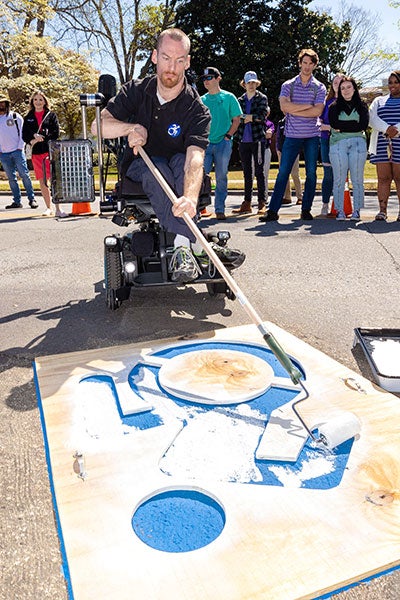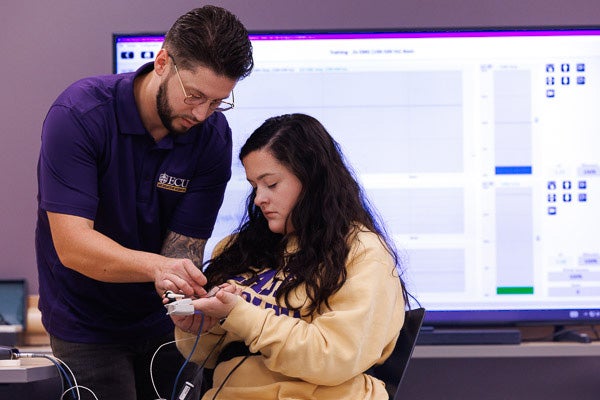Fifty years of enhancing recreational therapy
On the state level, ECU will host the North Carolina Recreational Therapy Association’s Student-Professionals Issues Forum on Feb. 21-22. This coincides with the national influence of ECU reaching 50 years of recreational therapy, dating back to initial leader Dr. Karen Hancock and the program’s inception in 1975.
“There is a lot to love in recreational therapy in serving communities of people with different disabilities,” said Marcos Ardon Lobos, a 2024 Master of Science graduate in recreation sciences with a concentration in recreational therapy administration.
Recreational therapy studies are part of the Department of Recreation Sciences in the College of Health and Human Performance. The program prepares students to become certified and licensed recreational therapists, boasting a year-to-year passing rate on the national certification exam between 95-100% for the past eight years.
Research initiatives

Brendon Hildreth paints an active accessible icon on main campus in 2022.
Virtual reality is a key component of ECU recreational therapy research, evidenced by the capabilities of the sailing simulator lab and the emergence of Lobos and Dr. Jaehyn Kim as on-the-rise experts in virtual reality intervention.
A recent study by Kim and Lobos, in collaboration with colleagues at Texas A&M University, showed that virtual reality Tai Chi intervention with older adults effectively reduces their stress and depressive symptoms. Their work was published in Innovation in Aging, suggesting the need for continued research and further exploration of virtual reality Tai Chi as a promising approach to geriatric mental health care.
ECU’s sensory integration in recreational therapy is led by Dr. David Loy, who has a son with Asperger’s syndrome. The Center for Biofeedback is a facilitator for Dr. Matthew Fish to collaborate with others, including students, as he furthers research in stress management and the psychophysiology of recreational interventions.
“I attribute the success of our students to the curriculum developed by the faculty and access to the biofeedback lab, sailing simulation and sensory labs for research and experiential learning,” said Dr. Clif Watts, chair of the Department of Recreation Sciences. “These labs are on the cutting edge of recreational therapy practice and can be integrated through the use of virtual reality simulations, small group activities or therapeutic interventions. We also offer significant opportunities for undergraduate and graduate students to perform research and are sources of multi-disciplinary research with fellow colleagues from the College of Health and Human Performance and outside of ECU. This uniquely positions the recreational therapy program at ECU, as very few programs in the U.S. feature this breadth of opportunities.”
Loy and then-student Brendon Hildreth, who has cerebral palsy, led an initiative in 2022 for ECU and community partners to shift to an updated, more active looking accessible parking icon,
“Coming from someone who has always had a disability and faced so many challenges in life, it has really opened my eyes to see how this RT program can not only help those with special needs, but so many other people in the population,” said student Deallaney Hudson, who lives with the rare genetic aging disorder neonatal progeroid syndrome. “It opens up a lot of options and people can overcome so much because of this program.”
The student experience

Dr. Matthew Fish performs a biofeedback test using monitors and other equipment. (Photos by Rhett Butler)
Madisyn-Rae Todd has a keen interest in holistic wellness, which naturally led her to researching recreational therapy at ECU.
She has since joined Hudson and others as eager students who tend to lead by example. Todd has progressed from a student interested in studying recreational therapy to the president of the recreational therapy student society at ECU.
“We work on all parts of well-being, whether that is physical, mental, social,” she said. “It’s so important to hit on all those different aspects. I feel very passionate working with individuals to improve overall well-being in their life. Classes are very hands-on and interactive. The things I learn in classes are exactly what I expect to see in the field. We also get to work with people in the community and get that valuable experience first-hand. I find that to be amazing.”
In collaborations outside the classroom and in community settings is where Dr. Cari Autry has seen students thrive.
“I love how involved our students are, and with our research opportunities,” said Autry, director of the sailing simulator lab in the Belk Building. “With our sailing simulator, as an example, there are many opportunities to realize physical and mental well-being through therapeutic use of sailing. I think students really enjoy experiencing this process in action.”
Celebrating 50 years
Various 50th birthday February celebrations serve as opportunities for current students, faculty and staff to connect with alumni.
This will include at the Student-Professionals Issues Forum, where scheduled sessions explore how to best use virtual reality in projects, navigating graduate school or the path to working in recreational therapy, and discussion of strategies and techniques to enhance health outcomes in recreational therapy. For Autry and other program leaders, this is a time to reflect and to look forward.
“I really wanted to be here because there is such a historical aspect and advantage of having our people in the field teaching or practicing,” Autry said. “There are a lot of really good things happening, but we are excited for the future, too.”